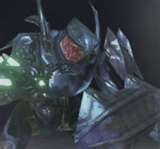Lekgolo: Difference between revisions
From Halopedia, the Halo wiki
m (→Trivia) |
No edit summary |
||
| Line 1: | Line 1: | ||
{{Ratings}} | {{Ratings}} | ||
{{Era|H1|H2|H3|H3R|HW|FOR|TF|FS|GOO|CH|HGN|UP}} | {{Era|H1|H2|H3|H3R|HW|LE|FOR|TF|FS|GOO|CH|HGN|UP}} | ||
<center>''See also [[Mgalekgolo]] for more information on Lekgolo assemblages.''</center> | <center>''See also [[Mgalekgolo]] for more information on Lekgolo assemblages.''</center> | ||
{{Covenant Species Infobox | {{Covenant Species Infobox | ||
Revision as of 08:37, November 21, 2009
Template:Covenant Species Infobox
The Lekgolo[1] (Latin Ophis congregatio[2]) are a species of small colonial worm-like creatures that can join together to form purpose specific assemblages, such as Mgalekgolo, commonly referred to by Humans as Hunters. The cores of Scarabs (the Halo 3 model) are also made up of Lekgolo worms.[3]
Every worm-like creature is an individual eel about 1.4 meters long, with its own central nervous system. It is speculated that the Lekgolo have microscopic muscular cilia which are used to connect to other Lekgolo and that each cilium is capable of communicating chemically similar to a synapse, explaining how the Mgalekgolo can become a collective being.
The only time that individual Lekgolo can be seen in the Halo games is in Halo 3. If you shoot at a dead Hunter's body, small eel-like creatures will fly out of the corpse, but will disappear after a few seconds.
History
The Lekgolo evolved on their homeworld of Te and fed by burrowing through the ground of their planet. They came into contact with the Covenant when the collective alien order landed in search of Forerunner artifacts. They found only the remains of a space station which had once contained many artifacts, but was now bare due to the actions of the worms, which had broken down and eaten the devices. The Prophets viewed this as heresy, and declared war on the Lekgolo in what would later be called the Taming of the Hunters.
The Lekgolo, however, proved to be a match for Covenant ground forces. They won the majority of ground battles and killed an unnamed Arbiter, though the latter was likely the intent of the Covenant.
The Covenant eventually began to threaten to glass the planet from orbit and thus absorbed the defeated worms into their ranks in 784 B.C.E.. Groups of the worms were given thick armor plates and Fuel Rod Cannons to help them serve the Covenant as Mgalekgolo.
With the Covenant Civil War, the species was divided into those that supported the Covenant Loyalists and the Covenant Separatists. The species' fate after the events of Halo 3 is unknown.
Trivia
- "Lekgolo" is Tswana for "one hundred", probably a reference to their hive-like physiology.
- Lekgolo blood is a luminescent orange, and supposedly smells like burnt plastic.[4]
- Lekgolo are Ophis Congregatio in Latin, Ophis meaning snake and Congregatio meaning assembly, society or union. Translated, it means "assembly of snakes", no doubt alluding to their physical structure.
- Lekgolo stopped Mendicant Bias from taking off in the Forerunner Dreadnought by short circuiting the ship's systems.
- In Halo 3, Scarabs are controlled by the Lekgolo, proven by the fact that they appear around the reactor of the vehicle. They also make up the joints of the legs of the Scarab.File:Scarab Lekgolo2.jpgLekgolo found in the core of a scarab.
- The Lekgolo are the most plentiful members of the Covenant, around the trillions in numbers.
- When you shoot a Hunter in Halo 3, a Lekgolo worm will fly out of the main colony, wriggle, squirm, and then disappear, as if it is going underground. Although the vanishing Lekgolo may simply be for technical reasons so they don't pile up in the room.
- The species has been described as being very technological. Before coming in contact with the Covenant, they were attempting to achieve spaceflight using native technology.
Named Mgalekgolo
See Also
Sources
- ^ Halo: Ghosts of Onyx, page 190 - "Lekgolo: the Elite name for the Hunter race".
- ^ Bestiarum
- ^ Bungie Weekly Update 01/11/08.
- ^ Halo: Ghosts of Onyx, page 221
